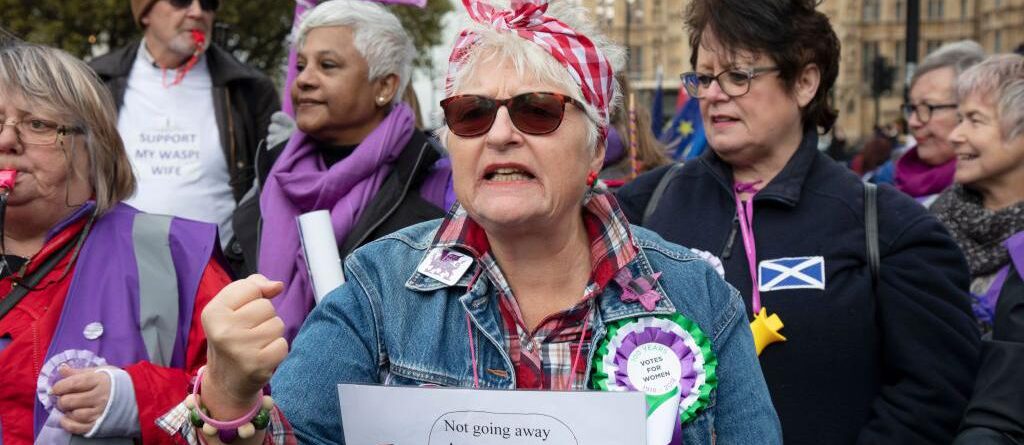UK Government denies compensation to Waspi women
Prime Minister Keir Starmer has defended the decision to reject compensation for women hit by changes to the state pension age, arguing that the taxpayer “simply can’t afford the tens of billions of pounds” in payments.
He added that “90% of those impacted knew about the changes that were taking place”.
However, during Prime Minister’s Questions, Sir Keir was repeatedly pressed on the government’s decision, with one MP calling for a vote.
The Women Against State Pension Inequality (Waspi) campaign group say that 3.6 million women born in the 1950s were not properly informed of the rise in state pension age to bring them into line with men.
In 1995, the government increased the pension age for women from 60 to 65, phasing in the change between 2010 and 2020.
The coalition government of 2010 opted to speed up the process, bringing forward the qualifying age of 65 to 2018.
Waspi says many of the affected women had made financial plans based on the old state pension age and some retired before realising they could not claim their pension.
The group been pushing for compensation, previously suggesting that some women should receive £10,000 each, at a cost of £36bn.
The current government’s decision not to award payments comes despite an independent government review in March which recommended compensation of between £1,000 and £2,950 for each of those affected.
Rebecca Hilsenrath, head of the Parliamentary and Health Service Ombudsman, which wrote the review, told Times Radio that although the government had accepted that it had delayed writing to 1950s-born women by 28 months, and apologised, it had rejected paying compensation.
“What we don’t expect is for an acknowledgement to be made by a public body that it’s got it wrong but then refuse to make it right for those affected,” she said.
Before this year’s general election, several senior Labour figures had backed the campaign and Sir Keir himself signed a pledge for “fair and fast compensation” in 2022.
In 2019, Angela Rayner, now the deputy prime minister, told the BBC: “They [the government] stole their pensions…we’ve said we’d right that injustice and within the five years of the Labour government we’ll compensate them for the money that they’ve lost.”
In the first Prime Minister’s Questions since the government announced they would not be providing compensation, veteran Labour MP Diane Abbott said the Waspi women had “fought one of the most sustained and passionate campaigns for justice that I can remember, year in, year out”.
“Does the prime minister really understand how let down Waspi women feel today?” she asked.
Ian Byrne, an independent MP, said the women were owed compensation for the “injustice done to them” and urged the prime minister to hold a vote on the subject.
And Conservative leader Kemi Badenoch said Labour had “played politics” with the group by previously supporting their campaign.
“She [Rayner] promised to compensate them in full… now they admit we were right all along.”
Responding to the criticism, Sir Keir said the delays to telling women about pension changes were “unacceptable”.
“I’m afraid to say that taxpayers simply can’t afford the tens of billions of pounds in compensation when the evidence shows that 90% of those impacted did know about it, that’s because of the state of our economy.”
Following PMQs, a No 10 spokesman said that since winning the election, the government had “had the chance” to look at the ombudsman’s report, which said the women “faced no direct financial loss as a result of the delays”.
The government has said compensation could cost up to £10.5bn.
But Ms De Spon said many Waspi women “didn’t know” about the pensions changes, and added that even to this day women were saying: “I never even received a letter, let alone when I received a letter.”
She added that former Conservative Chancellor George Osborne had saved more than £180bn by raising the state pension age and “boasted that it was easiest money he had ever saved”.
“We’re asking for a tiny fraction of that back as compensation for government failure,” she said.
The Waspi campaign also accused the prime minister of spreading “dangerous misinformation” by saying 90% of women had been aware of changes to the pension age.
“The fact that 90% of women had some general awareness of potential changes in the future does not mean they knew this would impact them personally,” said Waspi chair Angela Madden.
Diane Abbott is one of a small group of Labour MPs objecting to their leader’s approach. Kate Osborne and Emma Lewell-Buck have also publicly opposed the decision.
The SNP is calling for a vote in Parliament on compensation. The party’s Westminster leader Stephen Flynn said: “Labour Party politicians posed with Waspi women before the election only to leave them high and dry when they got into government.”
Earlier, Conservative shadow business secretary Andrew Griffith also said the decision was “a betrayal”, adding that Cabinet ministers had “queued up, had their photo taken with Waspi women, talked about how they were going to remedy that injustice.”
He said “we won’t know” whether a Conservative government would have paid compensation as they were voted out of government before making that decision.
The then Conservative-run Department of Work and Pensions told the ombudsman at the time of its report in March why it could not pay out.
It cited “the costs involved, the time it would take, the amount of resource it would involve, and the negative impact delivering a remedy would have on it being able to maintain other services”.
The Liberal Democrats had earlier said the stance “sets an extremely worrying precedent” in its rejection of the ombudsman’s findings.
Read more @bbc











